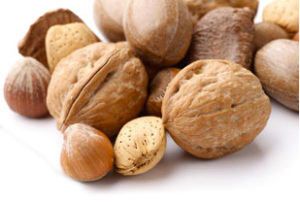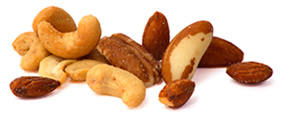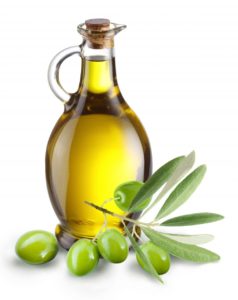 A large review of nut studies found that people eating a daily handful of nuts (about 20 g) have a lower risk of heart disease, cancer, stroke, premature death, and death from respiratory disease, type 2 diabetes, and infectious disease. Truly impressive. Benefits seem to be for all nuts, and also peanuts - which are called nuts, but are actually legumes (other posts about nut consumption benefits). An earlier post discussed how some of these effects could be to nuts lowering systemic inflammation throughout the body. Bottom line: try to eat a handful of nuts every day or most days a week for your health. And make it a variety of nuts - walnuts, almonds, hazelnuts, cashews, pistachios, pecans, Brazil nuts, and peanuts. From Science Daily:
A large review of nut studies found that people eating a daily handful of nuts (about 20 g) have a lower risk of heart disease, cancer, stroke, premature death, and death from respiratory disease, type 2 diabetes, and infectious disease. Truly impressive. Benefits seem to be for all nuts, and also peanuts - which are called nuts, but are actually legumes (other posts about nut consumption benefits). An earlier post discussed how some of these effects could be to nuts lowering systemic inflammation throughout the body. Bottom line: try to eat a handful of nuts every day or most days a week for your health. And make it a variety of nuts - walnuts, almonds, hazelnuts, cashews, pistachios, pecans, Brazil nuts, and peanuts. From Science Daily:
A handful of nuts a day cuts the risk of a wide range of diseases
A large analysis of current research shows that people who eat at least 20g of nuts a day have a lower risk of heart disease, cancer and other diseases. The analysis of all current studies on nut consumption and disease risk has revealed that 20g a day -- equivalent to a handful -- can cut people's risk of coronary heart disease by nearly 30 percent, their risk of cancer by 15 percent, and their risk of premature death by 22 percent. An average of at least 20g of nut consumption was also associated with a reduced risk of dying from respiratory disease by about a half, and diabetes by nearly 40 percent, although the researchers note that there is less data about these diseases in relation to nut consumption.
The study, led by researchers from Imperial College London and the Norwegian University of Science and Technology, is published in the journal BMC Medicine. The research team analysed 29 published studies from around the world that involved up to 819,000 participants, including more than 12,000 cases of coronary heart disease, 9,000 cases of stroke, 18,000 cases of cardiovascular disease and cancer, and more than 85,000 deaths. While there was some variation between the populations that were studied....the researchers found that nut consumption was associated with a reduction in disease risk across most of them.
The study included all kinds of tree nuts, such as hazel nuts and walnuts, and also peanuts -- which are actually legumes. The results were in general similar whether total nut intake, tree nuts or peanuts were analysed. What makes nuts so potentially beneficial, said Aune, is their nutritional value: "Nuts and peanuts are high in fibre, magnesium, and polyunsaturated fats -- nutrients that are beneficial for cutting cardiovascular disease risk and which can reduce cholesterol levels. "Some nuts, particularly walnuts and pecan nuts are also high in antioxidants, which can fight oxidative stress and possibly reduce cancer risk. Even though nuts are quite high in fat, they are also high in fibre and protein, and there is some evidence that suggests nuts might actually reduce your risk of obesity over time."
The study also found that if people consumed on average more than 20g of nuts per day, there was little evidence of further improvement in health outcomes. [ORIGINAL STUDY]

 Studies have found that increased nut consumption has been associated with
Studies have found that increased nut consumption has been associated with  More research support for extra virgin olive oil and the Mediterranean diet being associated with anti-cancer effects, In a study conducted in Spain, women supplementing their diet with extra EVOO (extra virgin olive oil) had a lower incidence of breast cancer after about 5 years.
More research support for extra virgin olive oil and the Mediterranean diet being associated with anti-cancer effects, In a study conducted in Spain, women supplementing their diet with extra EVOO (extra virgin olive oil) had a lower incidence of breast cancer after about 5 years.